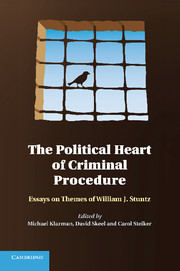Book contents
- Frontmatter
- Contents
- Contributor List
- Introduction: Appreciating Bill Stuntz
- Part I The Political Economy of Substantive Criminal Law
- 1 The Political Economy of Capital Punishment
- 2 Bill Stuntz and the Principal–Agent Problem in American Criminal Law
- 3 Overcriminalization for Lack of Better Options: A Celebration of Bill Stuntz
- 4 Stealing Bill Stuntz
- Part II Police Investigations
- Part III Emotion, Discretion, and the Judicial Role
- Index
- References
1 - The Political Economy of Capital Punishment
Published online by Cambridge University Press: 05 March 2012
- Frontmatter
- Contents
- Contributor List
- Introduction: Appreciating Bill Stuntz
- Part I The Political Economy of Substantive Criminal Law
- 1 The Political Economy of Capital Punishment
- 2 Bill Stuntz and the Principal–Agent Problem in American Criminal Law
- 3 Overcriminalization for Lack of Better Options: A Celebration of Bill Stuntz
- 4 Stealing Bill Stuntz
- Part II Police Investigations
- Part III Emotion, Discretion, and the Judicial Role
- Index
- References
Summary
On March 9, 2011, the State of Illinois formally abolished capital punishment. Illinois thus became the sixteenth state without a death penalty, and one of four states – the others being New Mexico, New Jersey, and New York – to join those ranks within the past five years. Governor Pat Quinn, a Democrat, signed Senate Bill 3539, the abolition law sent to him by the Illinois legislature almost two months earlier, and also commuted the death sentences of all fifteen inmates on death row in Illinois.
Abolitionists across the United States and around the world rejoiced, including Sister Helen Prejean and the Reverend Desmond Tutu, both of whom had personally encouraged Governor Quinn to sign the bill. The European Union issued a congratulatory message, and Amnesty International USA’s Executive Director, Larry Cox, called it “a landmark day for Illinois and the United States.” According to Cox, “No state has tried harder to fix its death penalty system, but after 10 years it became patently clear that it was broken beyond repair.”
- Type
- Chapter
- Information
- The Political Heart of Criminal ProcedureEssays on Themes of William J. Stuntz, pp. 29 - 46Publisher: Cambridge University PressPrint publication year: 2011



